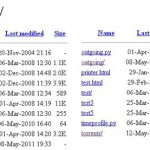Weekly News Roundup (22 May 2011)
A fairly quiet week this one, I guess there’s not really much of a point to write news when the world is ending today. I guess there’s also not much point in writing this WNR, but I can’t think of a better way to go out than in a blaze of angry, angry ranting. There’s no time to waste, as the apocalypse may be upon us any second, and I’d hate to write all this and not have time to send it out. So let’s get started.
 Let’s start with copyright news. The French have enjoyed their three-strikes system for some time now, although I’ve yet to actually hear any good news about a reduction in piracy or rise in consumer purchasing or anything like that, which is the whole point of the exercise, non?
Let’s start with copyright news. The French have enjoyed their three-strikes system for some time now, although I’ve yet to actually hear any good news about a reduction in piracy or rise in consumer purchasing or anything like that, which is the whole point of the exercise, non?
Anyway, one of the private firms the government pays to spy on its own citizens, to gather IP addresses for warning notifications and all that, has had a security breach this week. Trident Media Guard had one of its test servers “hacked” into, with data and tools stolen. From what I gather, it’s not much a case of hacking, as a case of very very lax security, which allowed anyone to browse the contents of the server. A lot of stuff turned up, which ironically made its way to P2P networks in short order, and it includes things like IP addresses that the company uses to track users, plus tools to create fake peers (again, for data collection). Basically stuff that hackers can take a look at and find a way to block TMG from being able to conduct their activities successfully. But the bigger issue is that whether a company tasked with handling sensitive data should be held to higher standards when it comes to security, because while no personal data has been leaked so far, it could very well have if TMG maintains their other servers in the same manner.
But by far the biggest story of the week was a response to last week’s big story, which was the proposed PROTECT IP act, which will give the government power to shut down any website it deems “unacceptable”, including messing with the domain name system (DNS) at the very core of the Internet, as well as forcing search engines to adopt censorship. And as expected, a search engine company, the biggest in fact, has come out fighting against the proposed act. Google’s Chairman, Eric Schmidt, says the company will fight PROTECT IP even if it becomes law. While Schmidt was primary talking about the government messing with DNS, I’m sure Google is even more concerned about the forced search engine result filtering. But messing with DNS is extremely dangerous, because the DNS system is probably the most important Internet protocol, as it maps domain names to the IP address of the servers that hosts the website. The current system is like a huge peer-to-peer network, where an authority server shares information with the rest of the world, and data propagates to every other DNS server. But if the US starts messing with the DNS records in the US, and then Europe does the same, and every other country, then this could very well break down the very thing that is essential for visiting websites. Prominent engineers and Internet pioneer have already warned the US against this, but the RIAA/MPAA lobbying was just too great (and they could care less if the Internet breaks, and it’s probably something they’ll welcome).
And make no mistake, the push behind PROTECT IP is all RIAA and MPAA. This is why, following Google’s statements, both the RIAA and MPAA came out attacking Google, one accusing the search giant of benefiting from criminal activities, and the other saying Google is acting as if they’re above the law. Last week, I ranted about the aim of copyright, which is to protect the public’s right to have access to information, as well as to promote creativity. What the RIAA and MPAA want almost the exact opposite of what copyright is all about, and so if anyone is acting as if they’re “above the law”, it’s the movie studios and record labels. And even if they’re right about copyright and the need to censor certain websites, then why should the tax payer, search engines like Google, ISPs, pay for this? And all for something that will probably be easy to bypass anyway. The RIAA and MPAA thinks they’re entitled to their business model and large profits forever, and want everyone else to pay to ensure they keep their entitlements.
Moving on now to gaming. The Free Software Foundation (FSF) is launching a protest against the DRM regime of Nintendo’s new 3DS, which actually allows Nintendo to brick anyone’s 3DS console if it detects that it has been modified in any way. So instead of waiting for Nintendo to brick their consoles, they decided that Nintendo should be the one that’s “bricked” first. The FSF has started an innovative protest, with people donating money to the recognized non-profit organisation, and for every $10 donated, they will send a brick to Nintendo’s CEO (presumably via mail, not via a projection through a window). For those that want better bang, or bricks, for their buck, they can donate $250, the cost of a 3Ds, and have 30 bricks delivered to Nintendo HQ. The campaign was set to end once 200 bricks had been delivered, but due to popular demand, it’s still going on at the moment, and if you want Nintendo to get the message that we are buying the hardware, not just merely licensing it (and so we should be able to do whatever we want with it), go here and donate.

Not much in HD or 3D news, but I’ll try to jam in something almost unrelated here just to take up some space. It’s not to unrelated, as Netflix does do HD, and I’m sure they’ll offer 3D sometime soon as well.
The good news is that Netflix is finally coming to Android. The slightly bad news is that it won’t be available on all phones, and Netflix are individually testing each and every phone to ensure compatibility. This is necessary because of the lack of a standardized streaming platform for Android phones, something Google really needs to look at. But I’m also pretty sure this has something, or maybe everything, to do with DRM, something the Netflix has hinted before when asked why it’s taking so long for the Android app the arrive. To try and do anything innovative on the Internet these days when it comes to entertainment, companies have to jump through hoops to meet the paranoid demands of entertainment companies, the rights holders, and in this case, Netflix has to get DRM nice and tight before the movie studios would allow Netflix to deliver content on Android phones. I guess the studios are worried that somehow people will crack the app, and capture the video stream and distribute the SD YouTube quality footage online. Yeah, I’m sure that’s likely, considering how hard it is for people to rip DVDs and Blu-ray’s. Almost as likely as people ripping movies via HDMI, now that HDCP has been cracked. Luddites. Interestingly, he original Luddite movement was borne out of fear of the Industrial revolution, with Luddites destroying machines and anything that represented progress. Sound like anyone to you? The only difference is that the RIAA and MPAA have the government on their side, which the original Luddites did not.
![]()
And finally in gaming, yep, the PSN is back baby. Well sort of. Some of the functions are still not, um, functioning, but at least gaming is back.
Of course, it’s another week, and another set of security breaches being discovered at Sony and their affiliates. The most annoying of all was that a rather stupid flaw was found in the very system that was supposed to bring security back to the PSN – the password reset function. With Sony forcing everyone to update their firmware and then change their PSN password before they’re allowed back on, you would think that Sony would at the very least ensure this process was secure. But alas, that was too much wishful thinking. The flawed password reset system would allow anyone who had your birth date, and PSN email address (which at this point, is about everyone), to reset your password, and hence gain access to your account on the “new and secure” PSN. And so while Sony went about fixing the flaw, the password reset system was down, and so people like me, who had not reset their password yet, were left without PSN for another couple of days. A lot of people would have been able to reset their passwords on the console it self, but many, who like me, that didn’t create the account on my current console had to use the web version (my original died and was replaced by Sony, more on that below), which was down. There were also other stories about Sony owned ISPs also revealing user information, but I suppose these kind of stories will be plentiful as Sony conduct a full security audit of all their systems.

Zombie killing fun in Dead Nation - one of the free games available in selected regions as part of the PSN "Welcome Back" package
Sony also detailed the goodies people will get once the PSN store, one of those non-functioning functions, comes back. People will be able to download two games from a list of five, including inFAMOUS, Wipeout HD + Fury, and Little Big Planet. Different regions will get slightly different sets of free games, and there are also PSP games that PSP gamers can download. I think I’ll get Wipeout HD + Fury for my 3D TV, and so far undecided between inFAMOUS, LittleBigPlanet, or Dead Nation (I just can’t resist Zombie games).
One slight problem, that doesn’t affect me, is that at least in the EU and here in Australia (and NZ), only those that had PSN accounts before the network went down on the 20th of April are eligible for the freebies. Which kind of sucks, because I would have thought that the people who got new PS3s after the 20th would be even more deserving of a “we’re sorry” gift, as the last thing you want after forking out a lot of money for a PS3 is for half the functions to not even work for weeks. I mean how much could it actually cost Sony to allow all PSN users, up to say today, to be eligible for the welcome back package? This is exactly why people hate Sony.
Thinking about the earlier 3DS protest thing, one lesson I hope Sony learns from this incident is that people *buy* their console, not license them, so you can’t just take away features without repercussions. And if we’re really just licensing the hardware, then the hardware should be a lot cheaper, and we should receive refunds for outages (just like anything you can license, if you can’t actually use the licensed service of feature, then you should get your money back). Without these checks and balances, what’s to stop Sony from removing a core feature, like say AVI/DivX playback or DLNA support to stop pirated files from being played on the console? I mean, if they are allowed to remove “OtherOS” for “financial reason”, then they can use the same argument to remove other features as well. Of course, it’s not in Sony’s interest to remove either of these features, but that’s now, who knows what will happen in the future.
For Xbox 360 owners, you should now be getting the “Spring” update notice, or will get it soon. There’s misleading information around that this update will brick certain Xbox 360’s, which is not true (at least not yet). What had happened was that a previous update, and not the Spring update, had caused some Xbox 360’s to fail, and Microsoft has already promised to replace all failed 360’s due to that other firmware update (mostly older Xbox 360 60GB Pro’s) with brand new consoles. You see, that’s the right thing to do. The PS3 is actually more notorious for firmware induced bricking (or at least a drive that no longer reads any discs – something that I’ve experienced personally – luckily, my PS3 was still in warranty at that time, as otherwise I would have had to pay $AUD 250 for the repair), and the only response from Sony was to respond to the various class action lawsuits launched against the company for this alleged fault. This is also exactly why people hate Sony.
Alright, that’s it for this week. See you next week (if the world hasn’t ended by then).


